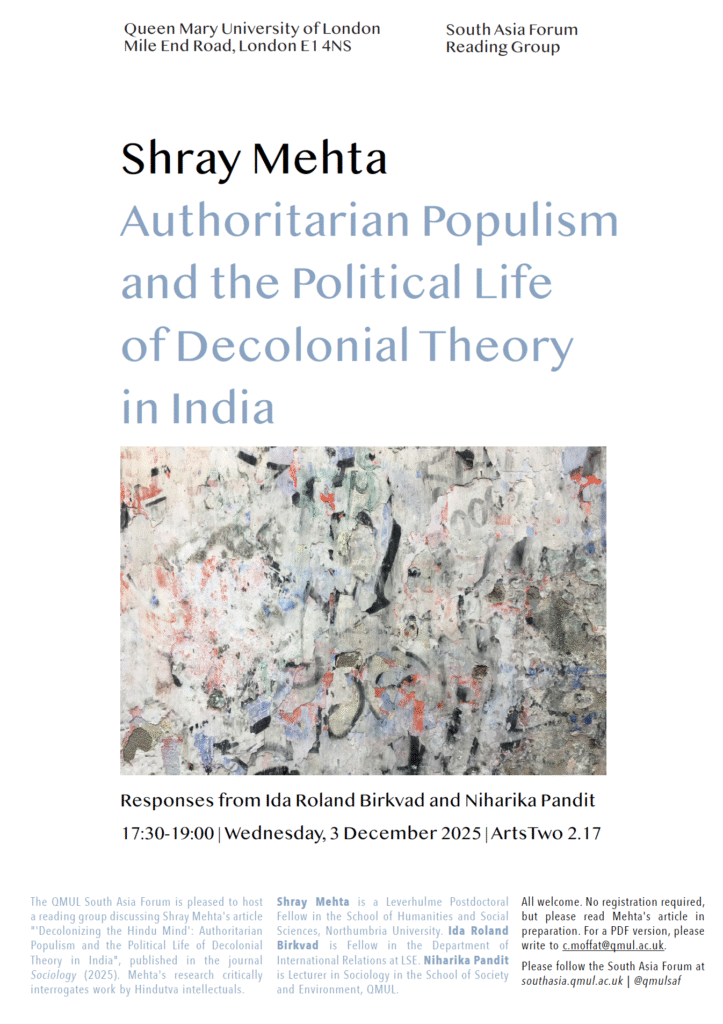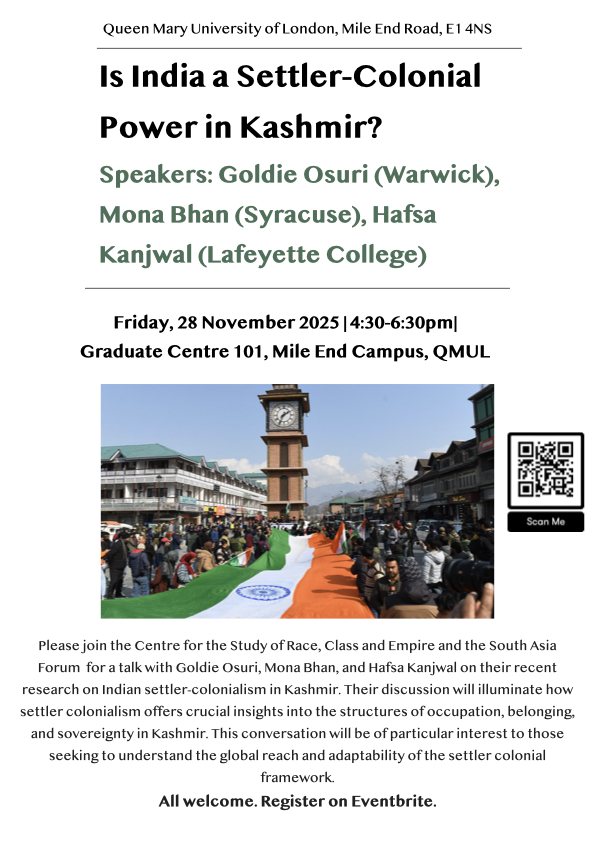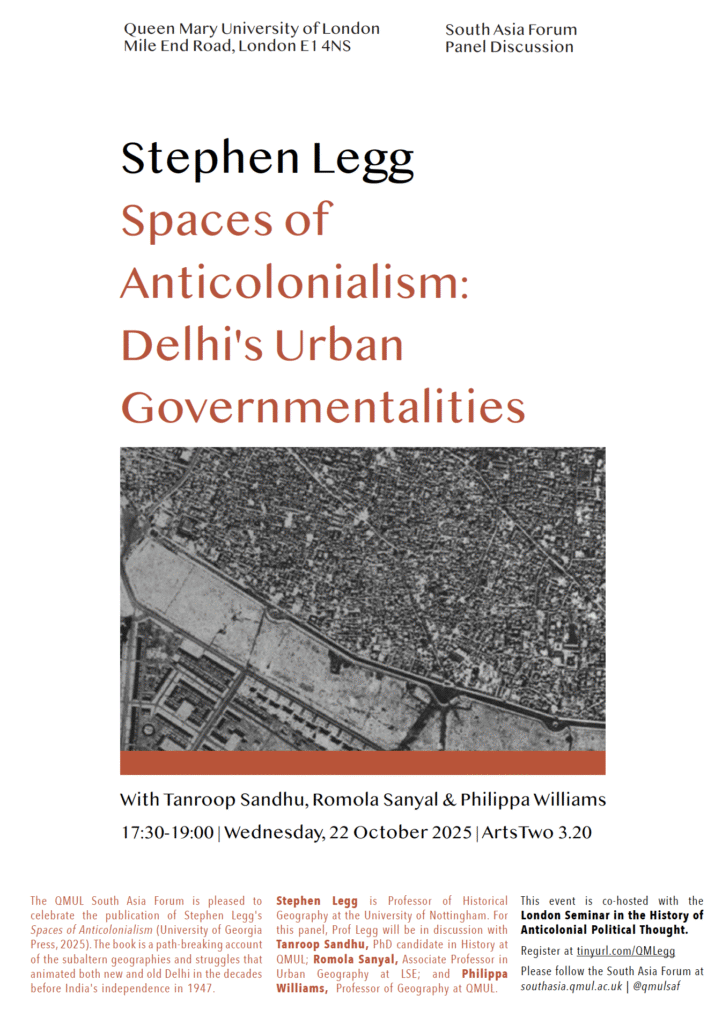Events
Niharika Pandit, ‘Occupying the Everyday’
Thursday 19th March, 2026
5:30 pm, BLOC Cinema, ArtsOne, QMUL
You are invited you to the launch of Niharika Pandit's book, Occupying the Everyday: Militarisation and Gendered Politics of Living in Kashmir, which is being published with Oxford University Press (the book is now released in the US as eBook, hardback and paperback with UK release in April).
Past Events
Shray Mehta, ‘Authoritarian Populism and the Political Life of Decolonial Theory in India’
Wednesday 3rd December, 2025
5:30 pm, ArtsTwo 2.17

The QMUL South Asia Forum is pleased to host a reading group discussing Shray Mehta’s article “‘Decolonizing the Hindu Mind’: Authoritarian Populism and the Political Life of Decolonial Theory in India“, published in the journal Sociology (2025). Mehta’s research critically interrogates work by Hindutva intellectuals.
Shray Mehta is a Leverhulme Postdoctoral Fellow in the School of Humanities and Social Sciences, Northumbria University.
We will open our discussion with responses from Ida Roland Birkvad, Fellow in the Department of International Relations at LSE, and Niharika Pandit, Lecturer in Sociology in the School of Society and Environment, QMUL.
All welcome. No registration required, but please read Mehta’s article in preparation. For a PDF version, please write to c.moffat [@] qmul.ac.uk.
Is India a settler-colonial power in Kashmir?
Friday 28th November, 2025
4:30 pm, Graduate Centre 101
Please join the Centre for the Study of Race, Class and Empire and the QM South Asia Forum for a talk on Indian settler-colonialism in Kashmir on Friday, 28th November 2025 from 4.30-6.30pm at Graduate Centre 101.
The speakers, Goldie Osuri (Warwick) Mona Bhan (Syracuse University) and Hafsa Kanjwal (Lafayette College) will address how settler colonialism offers crucial insights into the structures of occupation, belonging, and sovereignty in Kashmir. This conversation will be of particular interest to those seeking to understand the global reach and adaptability of the settler colonial framework. For further details and registration, please click here.
Stephen Legg, ‘Spaces of Anticolonialism’
Wednesday 22nd October, 2025
5:30 pm, ArtsTwo 3.20
The QMUL South Asia Forum is pleased to celebrate the publication of Stephen Legg’s Spaces of Anticolonialism (University of Georgia Press, 2025). The book is a path-breaking account of the subaltern geographies and struggles that animated both new and old Delhi in the decades before India’s independence in 1947.
ALL WELCOME BUT PLEASE REGISTER AT TINYURL.COM/QMLEGG.
This event is co-hosted with the London Seminar in the History of Anticolonial Political Thought.
Stephen Legg is Professor of Historical Geography at the University of Nottingham. He is the author of a number of texts, including Spaces of Colonialism: Delhi’s Urban Governmentalities (2007), Prostitution and the Ends of Empire (2014), and Round Table Conference Geographies (2023), and editor or co-editor of the volumes Spatiality, Sovereignty and Carl Schmitt (2011), South Asian Governmentalities (2018, with Deana Heath), Subaltern Geographies(2019, with Tariq Jazeel), and Placing Internationalism (2021, with Mike Heffernan, Jake Hodder and Benjamin Thorpe).
For this panel, Prof Legg will be in discussion with
- Tanroop Sandhu, PhD candidate in History at QMUL;
- Romola Sanyal, Associate Professor in Urban Geography at LSE; and
- Philippa Williams, Professor of Geography at QMUL.
The panel will be chaired by Chris Moffat, Senior Lecturer in History at QMUL and co-Chair of QMUL SAF.
Jaydeep Sarkar, ‘Rainbow Rishta’
Thursday 27th March, 2025
4:00 pm, ArtsOne BLOC Cinema
Please join us for a screening of episode one of Rainbow Rishta (2023), followed by a talk from the filmmaker Jaydeep Sarkar and an audience Q&A. This event is hosted by the QM South Asia Forum and Peace in India.
All welcome but please click here to register via TicketTailor.
Rainbow Rishta is a GLAAD-nominated documentary series that premiered at the 2023 JIO MAMI Film Festival. Streaming on Amazon Prime Video, the six-part series explores real, powerful love stories across India, highlighting diverse queer experiences, including those of intersex individuals—voices seldom heard in mainstream media. Praised as a "Breakthrough Series" by Nikkei Asia, "Moving and Necessary" by Times Now, and "Raw and Genuine" by India Today, Rainbow Rishta is a pioneering work in South Asian queer storytelling.
Jesús F. Cháirez-Garza, ‘Rethinking Untouchability’
Thursday 20th March, 2025
5:00 pm, ArtsTwo 2.17
The QMUL South Asia Forum is pleased to celebrate the publication of Jesús F. Cháirez-Garza's Rethinking Untouchability: The Political Thought of B.R. Ambedkar (MUP, 2024). Centred on the Dalit leader B.R. Ambedkar (1891-1956), the book examines the transformation of 'untouchability' into a political idea in India during the first half of the twentieth century.
Dr Cháirez-Garza will be joined in a panel discussion by Dr. Nivi Manchanda (QMUL), Dr. Jayaseelan Raj (KCL) and Dr. Srilata Sircar (KCL). This event is co-sponsored by the Centre for the Study of the History of Political Thought at QMUL.
Film Screening: ‘I Am Not the River Jhelum’ (2022)
Friday 14th February, 2025
4:00 pm, Hitchcock Theatre, ArtsOne, QMUL
Tongues on Fire in partnership with the QMUL South Asia Forum (SAF) is holding a special screening of the film I Am Not The River Jhelum (2022). The screening will be followed by Q&A with the Director, Prabhash Chandra. The session will be moderated by Dr Toyeba Mushtaq.
Waqas Butt: ‘Life Beyond Waste’
Wednesday 30th October, 2024
5:00 pm, ArtsTwo 3.20
The QMUL South Asia Forum is pleased to host a panel discussion of Waqas Butt's new book, Life Beyond Waste: Work and Infrastructure in Urban Pakistan (Stanford, 2023). This historical and ethnographic account of Lahore demonstrates how waste work has been central to organising and transforming urban landscapes, infrastructures and life in the city.
Harsha Vadlamani: ‘After the Green Revolution’
Thursday 14th March, 2024
4:00 pm, Hitchcock Cinema, ArtsOne Building, QMUL Mile End Campus
The South Asia Forum is pleased to welcome Harsha Vadlamani to speak on his ongoing photography project, After the Green Revolution. This work documents the challenges facing farmers in Punjab today, fifty years after new technology, seeds and pesticides revolutionised farming to establish the 'food bowl of India'.
Azad Essa: ‘Hostile Homelands’
Wednesday 21st February, 2024
5:00 pm, Queen Mary University of London
The QMUL South Asia Forum is pleased to welcome Azad Essa for a discussion of his new book Hostile Homelands: The New Alliance Between India and Israel (Pluto, 2023). The book contextualises the political and ideological links between these two countries, from the origins of Zionism and Hindutva to today's growing military-industrial relationship.
Reading Group: Srila Roy’s ‘Changing the Subject’
Thursday 7th December, 2023
2:00 pm, ArtsTwo SCR (4th Floor)
The South Asia Forum and the Sexual Cultures Research Group are pleased to welcome Srila Roy for a discussion of her new book, Changing the Subject (Duke University Press, 2023). The book maps the rapidly transforming terrain of gender and sexual politics in India under the conditions of global neoliberalism.
Film Screening: ‘Chaityabhumi’
Thursday 2nd November, 2023
6:00 pm, Hitchcock Cinema, ArtsOne Building, QMUL Mile End Campus
The QMUL South Asia Forum is pleased to welcome the filmmaker Somnath Waghmare for a screening and discussion of his new documentary, Chaityabhumi (2023).
Every year, from 1-6 December, millions of Dalit-Bahujan arrive in Dadar, Mumbai, to pay tribute to Dr Babasaheb Ambedkar, the great anti-caste leader. Following Ambedkar's death on 6 December 1956, his followers built a Buddhist Chaitya in Dadar. The commemoration of his death is, however, met with disdain by the city's media and elite Mumbaikars. Waghmare's documentary explores the tensions of caste and public space in Mumbai as well as Ambedkar's legacy in India today.
Hafsa Kanjwal: ‘Colonizing Kashmir’
Thursday 12th October, 2023
6:00 pm, QMUL Mile End Campus
The QMUL South Asia Forum is pleased to welcome Hafsa Kanjwal for a seminar on her new book, Colonizing Kashmir (Stanford University Press, 2023). The book interrogates how Kashmir was made 'integral' to India in the aftermath of Partition, tracing new hierarchies of power and domination in a postcolonial state.
Ghazala Jamil: ‘Critical Silences, Missing Frames – Identity-Based Spatiality in India’
Tuesday 30th May, 2023
3:00 pm, Bancroft 3.20
The South Asia Forum is pleased to welcome Dr Ghazala Jamil to QMUL for this in-person seminar. Dr Jamil will speak about her research into discrimination, segregation and urban environments in India, assessing the conceptual frames available to researchers studying identity-based spatiality in this context.
Simona Sawhney: ‘Comrades, Strikes and Strifes’
Thursday 6th April, 2023
1:00 pm, Online
All are welcome to this South Asia Forum discussion of Yashpal's semi-autobiographical novel Dada Comrade (1941), a pioneering work of Hindi literature. We will be joined in conversation by the literary scholar and political theorist Simona Sawhney, translator of the new Penguin 'Modern Classics' English edition.
Nicky Falkof, Shilpa Phadke and Srila Roy: ‘Intimacy and Injury’
Thursday 9th March, 2023
12:30 pm, 14:00
Please join this South Asia Forum conversation with the editors of a new volume, Intimacy and Injury: In the Wake of #MeToo in India and South Africa (Manchester University Press, 2022). The book maps the shifting political field around gender-based violence in the global south, providing new directions for transnational feminist knowledge and solidarity.
Yogesh Maitreya: ‘Ambedkar – Loving and Publishing in the Time of Caste’
Tuesday 6th December, 2022
6:00 pm, QMUL Mile End Campus
On the occasion of Dr BR Ambedkar’s 66th death anniversary, the QMUL South Asia Forum is pleased to host this in-person seminar with Yogesh Maitreya. Maitreya will discuss his book, Ambedkar 2021, and explore Dr Ambedkar’s role not simply in the struggle for political and social liberation but as a literary force, too.
Vinayak Chaturvedi: ‘Hindutva, Violence and the Politics of History’
Monday 14th November, 2022
5:00 pm, QMUL Mile End Campus
The QMUL South Asia Forum is pleased to host this in-person seminar with Vinayak Chaturvedi on his new book Hindutva and Violence (SUNY Press, 2022). The book presents an intellectual history of VD Savarkar, the most controversial Indian political thinker of the 20th century and a key architect of modern Hindu nationalism.
Shruti Kapila: ‘On Violence, or the Importance of Indian Political Thought’
Wednesday 27th April, 2022
5:15 pm, Online and In Person (UCL)
The QMUL South Asia Forum is pleased to co-host this event with the IHR Seminar in the History of Political Ideas. Shruti Kapila will reflect on themes related to her new book, Violent Fraternity: Indian Political Thought in the Global Age (Princeton, 2021), a groundbreaking history of the political ideas that made modern India.
Book Discussion: ‘Tata’ by Mircea Raianu
Thursday 27th January, 2022
4:00 pm, Online
The QMUL South Asia Forum is pleased to welcome Mircea Raianu for this discussion of his new book, Tata: The Global Corporation that Built Indian Capitalism (Harvard University Press, 2021). Raianu will be in conversation with QMUL's Noam Maggor and Amit S Rai, chaired by Philippa Williams.
Bangladesh at 50: Beyond Rhetoric
Thursday 9th December, 2021
1:00 pm, Online
Please join us for a three-day online conference on Bangladesh at 50, hosted by the QMUL South Asia Forum. The conference will bring together scholars of, and from, Bangladesh for critical discussions on history, politics, and culture. Going beyond the much-celebrated rhetoric of economic growth and development, scholars will engage with the following questions: what visions emerged in the making of Bangladesh? Who are the powerful and the excluded? What has it meant to live on the margins of the state? What are the spaces and politics of resistance? The conference will address issues affecting the lives of marginalised in Bangladesh, exploring a wide-range of topics such as climate change, capitalism, labour rights, LGBT issues, violence and state power. Come along for this urgent discussion at the important juncture of Bangladesh turning 50. This conference will be hosted on Zoom.
In Conversation with Marvi Mazhar: ‘Karachi’s Edge’
Tuesday 16th November, 2021
1:00 pm, QMUL Mile End Campus; ArtsTwo SCR
Please join the QMUL South Asia Forum for this special In Conversation event with the Karachi-based architect and researcher Marvi Mazhar. Mazhar will share aspects of her recent research on Karachi's urban coastal periphery and its ecology. She will place this work in the context of her longer interest in Karachi's inner city.
Marvi Mazhar is an architect and researcher whose practice combines visual culture, spatial advocacy and interventions. Her architecture and design studio, Marvi Mazhar & Associates, is based in Karachi, Pakistan. Mazhar has recently completed a Masters in Research Architecture at Goldsmiths University of London.
Screening + Podcast: Filmmaking and Revolutionary Possibility in India, with Sanjay Kak
Monday 14th December, 2020
12:00 pm, Online
Discussion of ‘Imagining Afghanistan’ by Nivi Manchanda
Wednesday 18th November, 2020
5:00 pm, Online
All are welcome to this South Asia Forum discussion on Nivi Manchanda's new book Imagining Afghanistan: The History and Politics of Imperial Knowledge (Cambridge University Press, 2020). The online webinar will feature contributions from the author, Dr Nivi Manchanda (SPIR, QMUL), and a response from Prof Kim Wagner (History, QMUL).
Film Screening + Panel Discussion: Lynch Nation
Friday 30th October, 2020
6:00 pm, Online
Please join us for this South Asia Forum public event in collaboration with the UK Asian Film Festival. The screening and panel discussion are free but be sure to register to attend via Zoom.
Lynch Nation: A relentless journey across India, listening to heart-wrenching stories of mob lynching that have torn apart families and shaken the entire nation. The film documents seven incidents of mob lynching by traveling through the personal spaces of the victims and recording the testimonies of their families and survivors.
Film Screening + Panel Discussion: Lynch Nation – POSTPONED
Friday 27th March, 2020
5:30 pm, ArtsOne LT
Please join us for this South Asia Forum public event, in collaboration with the UK Asian Film Festival. Attendance is free but register to attend via Eventbrite.
Lynch Nation: A relentless journey across India, listening to heart-wrenching stories of mob lynching that have torn apart families and shaken the entire nation. The film documents seven incidents of mob lynching by traveling through the personal spaces of the victims and recording the testimonies of their families and survivors.
Panel Participants include: Furqan Faridi (Director); Amrit Wilson (Author and Activist); Rohit Dasgupta (University of Loughborough and Labour Councillor, Newham); Akshi Singh (QMUL); and Annapurna Waughray (Manchester Metropolitan University, Co-Investigator, Equality and Human Rights Commission ‘Caste in Britain’ Project). Chaired by Ashvin Devasundaram (QMUL).
Public Lecture: Renisa Mawani, ‘Turning Nationals into Foreigners: The Ingress into India Ordinance’
Thursday 5th March, 2020
6:00 pm, Arts Two LT
The 2019-20 Cotterrell Lecture in Sociological Jurisprudence: In this lecture Professor Renisa Mawani will trace the emergence, development, and consequences of the Ingress into India Ordinance across colonial India, Burma, and Siam. Issued by the Indian colonial government in September 1914, in direct response to the anticipated arrival of the Komagata Maru, the ordinance afforded unprecedented power to Indian authorities. It allowed local police and magistrates to apprehend, arrest, and detain anyone suspected of seditious and anti-British sentiments, thereby unleashing a violent expression of juridical power that was justified through the onset of World War I. What is notable in the longer history of India’s ordinances is the prominent role of the sea.
In this lecture, Professor Mawani will read the oceanic elements of the Ingress and trace its expansive reach across the Bay of Bengal – from India to Burma and Siam - through the lives of Indian merchants suspected of sedition and radicalism abroad.
CLSGC Symposium: On Renisa Mawani’s ‘Across Oceans of Law’
Tuesday 3rd March, 2020
4:00 pm, Room 313, School of Law
The CLSGC is delighted to be hosting an interdisciplinary symposium on Professor Renisa Mawani’s Across Oceans of Law.
Professor Mawani is Professor of Sociology at the University of British Columbia. Professor Mawani will introduce the book, and this will be followed by comments and discussion.
Commentators: Dr Luis Eslava (Kent, TBC); Professor Laleh Khalili (QMUL); Professor Stewart Motha (Birkbeck); Dr Simon Layton (QMUL); and Dr Surabhi Ranganathan (University of Cambridge).
Chaired by Dr Eva Nanopoulos (QMUL) and organised by Professor Maks Del Mar (QMUL).
Public Lecture: Sunil Gupta, ‘From Here to Eternity – Race, Migration and Queer Identity’
Wednesday 12th February, 2020
6:00 pm, QMUL Mile End Campus, Arts One LT
In this South Asia Forum public lecture, photographer and curator Sunil Gupta will critically address issues of race, migration and queer identity with a focus on India in relation to his photographic practice since the 1970s. Over the last thirty years, Gupta’s work has focused on agency and empowerment in India’s gay communities, where until September 2018 homosexuality was a criminal act under colonial-era law, punishable with ten years of imprisonment. RSVP via Eventbrite here: qmsunilgupta.eventbrite.com
Teach-In: ‘Hindutva and the University’
Wednesday 22nd January, 2020
6:00 pm, QMUL Mile End Campus, ArtsTwo 3.20
With Mehroosh Tak (Kashmir Solidarity Movement), Meena Dhanda (Wolverhampton), Akanksha Mehta (Goldsmiths) and Rahul Rao (SOAS), chaired by Akshi Singh (QMUL). This panel will discuss the role played by pedagogy and knowledge production in the Hindu nationalist project, as well as the forms of learning, knowledge, and organising that are seen as threats to it. In doing so, it will place the recent attacks on Indian universities within a longer history of military occupations and everyday violence against minorities in India.
Discussion of ‘Jugaad Time’ by Amit S Rai
Wednesday 9th October, 2019
5:00 pm, Arts Two Senior Common Room (4th Floor), QMUL
All are welcome to the South Asia Forum discussion of our colleague Amit S Rai’s new book, Jugaad Time: Ecologies of Everyday Hacking in India (Duke University Press, 2019). Amit, who is Reader in Creative Industries and Arts Organising at QMUL, will be in conversation with Gerard Hanlon (Professor of Organisational Sociology, QMUL), chaired by Shital Pravinchandra (Lecturer in Comparative Literature, QMUL).

